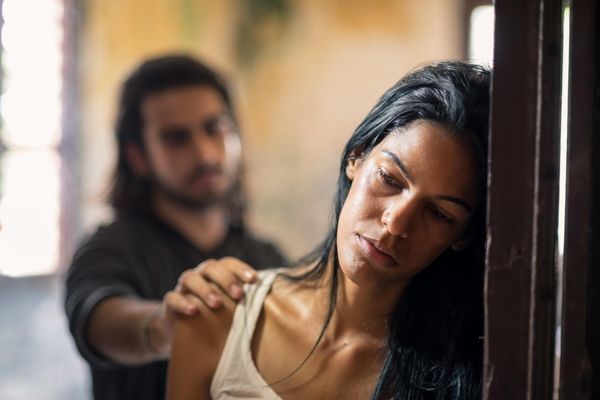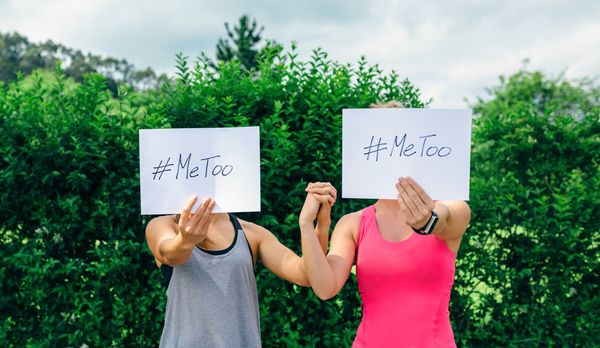April is Sexual Assault Awareness Month.
I was a carefree 11-year-old walking down the street when a man approached me, swiftly grabbing my breast before running off. While I didn’t have the words for it then, it was sexual assault, and it wouldn’t be my only experience. There was the time when a man on a crowded subway pushed his erect penis onto my thigh. Then there was the time I was walking to work and a man came up behind me on a bike and grabbed my butt so hard that the pain (not to mention the violation) left me in tears.
Experiences like this are alarmingly common.
Every 68 seconds, a person is sexually assaulted in America — and more than half of all women experience some form of physical sexual violence in their lifetimes, according to the Centers for Disease Control and Prevention. But what is considered sexual assault and what steps do you need to take if it’s happened to you? Here’s what you need to know.
What does sexual assault mean?
Simply put, sexual assault is any type of sexual contact that happens without the person consenting, or agreeing, to the sexual activity. This includes situations when the person can’t consent, which includes anyone who is underage, intellectually disabled, passed out, high or drunk.
People often think of sexual assault as rape, but there are many other types of sexual assault, including incidents that don’t involve physical touch, such as someone sharing sexually explicit photos or “flashing” — exposing their genitals.
Physical types of sexual assault can range from touching or fondling over or under clothing to rape. What is always the same is that the person who is committing the assault is crossing a boundary and forcing a sexual action that is unwanted on someone else.
Sexual assault is an extremely underreported crime that can happen to anyone, but women and transgender people are overwhelmingly the targets. Nine out of 10 victims are women, and some reports suggest that half of all transgender people experience some form of sexual assault or abuse.Types of sexual assault
- Rape or attempted rape: The Department of Justice defines rape as “the penetration, no matter how slight, of the vagina or anus with any body part or object, or oral penetration by a sex organ of another person, without the consent of the victim.” Rape can be committed by a stranger or someone you know. In fact, 8 out of 10 rapes are committed by someone known to the victim. Date rape and marital rape, which occurs between romantic partners or spouses, are forms of acquaintance rape.
- Unwanted touching: This includes any intentional sexual touching, over or under clothing, that is unwanted.
- Sexual contact with a minor: The age of consent, which is the age when it is legal for a person to agree to sexual activity, ranges from 16 to 18 years old depending on the state. Any sexual contact by an adult with someone younger than the age of consent — even with consent — is considered assault or statutory rape.
- Incest: Sexual contact between family members, and often involves ongoing sexual abuse of children.
- Indecent exposure: When someone exposes their genitals in public or to another person without consent.
- Peeping: When someone watches private sexual acts without consent of those engaged in the acts.
- Sexual images/video: Forcing someone to look at or pose for images or videos of sexual content against their will.
- Sharing sexual content: Often called “revenge porn” when done online, sharing intimate content without the other party’s consent is a form of sexual assault.
- Sexual threats or harassment: Coercing or persuading someone to engage in sexual activity with threats of violence or harm to their family, career or reputation.
What is the meaning of consent?
Whether an act is considered sexual assault hinges on consent. While the legal meaning of consent varies by state and situation, it boils down to the people involved actively and knowingly agreeing to a sexual encounter.
Consent can be reversible, which means it’s OK to change your mind if you agreed earlier. Consent isn’t granted by circumstances, such as how you’re dressed, how many sexual partners you’ve had or whether you’ve previously had sex with the same partner. Physiological responses such as arousal or even having an orgasm don’t mean you have consented.
Sex can be nonconsensual even if you don’t expressly say “no,” especially if you’re disengaged or showing that you’re uncomfortable or upset.
The best course of action to ensure consent is to both ask about your partner’s boundaries and be specific about your own.
What to do if you've been sexually assaulted
- First, know that you are not to blame. “There is a lot of mixed messaging, judgment and shaming in our culture about the body and sexuality,” said Erika Shershun, LMFT, somatic therapist and author of the “Healing Sexual Trauma Workbook.” “Often the deep conditioning around these issues creates a feeling of shame for something [the victim] had no control of … most survivors freeze, then blame themselves for not having done more to fight.”
- If you are in danger, call 911 or a trusted friend and get to a safe space.
- Note the details of what happened and any details about the person who assaulted you.
- If you’ve been physically assaulted, save everything that could have the perpetrator’s DNA. Don't comb, brush, clean or wash any part of your body, and don’t change your clothes, if possible. If you do change your clothes, keep what you were wearing in a bag that you can bring to the hospital or police station. Don't alter or touch anything from the assault location. Even if you ultimately decide not to report the crime, keeping evidence intact will help the investigation if you do.
- Get medical help if you’re injured. Call for an ambulance or go to the nearest hospital to treat any injuries right away. If you were raped, it’s a good idea to have a rape kit done, which will provide evidence if you decide to take legal action. You can get tested for sexually transmitted infections (STIs), get a post-exposure prophylaxis (PrEP) to help prevent HIV and get Plan B emergency contraception to prevent pregnancy. If you think you were drugged, ask to be tested.
- Get support for the emotional trauma and be patient with yourself. “Shock, fear, grief, shame, anger and/or rage are common emotions that come up before and during the healing process,” Shershun said. “Some people suppress, minimize or compartmentalize the trauma, and for some, the memory is repressed. This is not a conscious choice; rather, their mind and body’s way of not causing further overwhelm and therefore further trauma to their system.”
Working with a therapist, calling a rape crisis hotline, talking to a trusted friend and journaling can help you process what happened.
“No matter what happened to you, it wasn’t your fault — you did not give permission,” Shershun said. “Your body did what it had to do to help you survive. It’s never too late for you to heal. With the right tools and support, healing is always possible. You are not alone.”
If you or someone you know is or has been a victim of sexual assault, contact the National Sexual Assault Hotline at 800-656-HOPE (4673) or the National Domestic Violence Hotline
at 800-799-SAFE (7233).
Resources
National Sexual Violence Resource Center (NSVRC)
State organizations and hotlines
The National Domestic Violence Hotline can also help you find programs in your area. Call 800-799-SAFE (7233).
The VictimConnect Resource Center provides a place for crime victims to access information about their rights, options, resources and referrals. Go online or call 855-4-VICTIM (855-484-2846).
- Being A Queer Survivor of Sexual Assault in the Military Was ... ›
- Marital Rape Is Still Legal ›
- Hospitals Are Allowing Medical Students to Perform Pelvic Exams on Unconscious Women — Without Their Consent ›
- Memory Loss After Sexual Assault Is Real Phenomenon - HealthyWomen ›
- Good Sex with Emily Jamea: Healing After Sexual Assault - HealthyWomen ›
- You Can't Put a Band-Aid Over a Bullet Hole: How I Healed From Sexual Trauma and Substance Abuse - HealthyWomen ›







